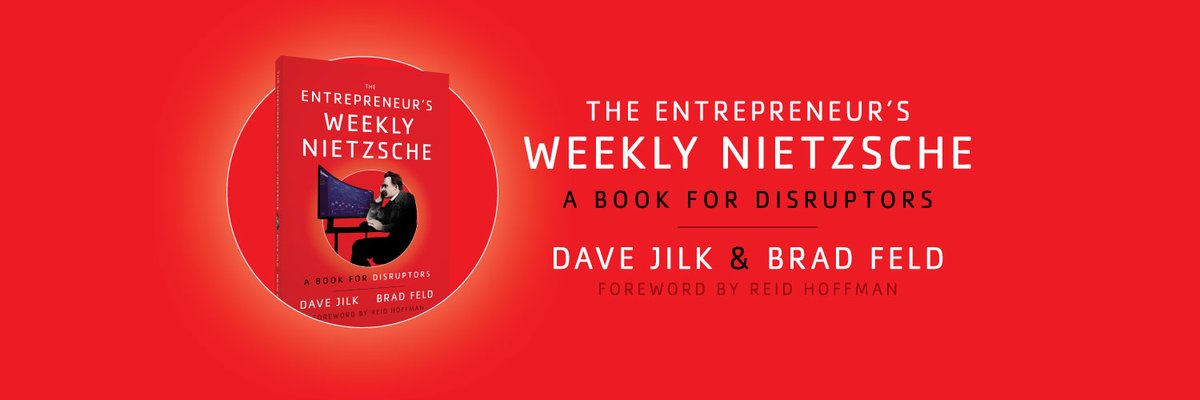A leap forward in AI ethics and safety
July 5, 2024

Dave and Brad: The project dates back to 2013, when we had a brief discussion about a line Nietzsche wrote, and made the observation that it sounded a lot like an entrepreneur. Dave was reading quite a bit of Nietzsche at the time and kept noticing ideas and aphorisms that seemed to apply. We are always looking for projects we can do together, so in 2016 we decided to see if we could make it into a book. The timing turns out to be very good: because of the popularity of Stoicism in Silicon Valley, especially through Ryan Holiday’s work, many entrepreneurs are becoming more accustomed to the idea that philosophy – in the sense of thinking deeply, and with a particular style – can play a role in entrepreneurship, business, and life in general.
Both of us have been influenced by Stoicism and found it powerful as a way to get things done and stay mentally composed. But Nietzsche adds a profound element of the intensity and obsession that an entrepreneur needs to create disruptive change. We think that adding a taste of Nietzsche to the library of entrepreneurs could continue this project of entrepreneurs thinking harder and more philosophically about what they are doing – not only to make their businesses more successful, but also to improve their lives and possibly the broader society.
We should add that Nietzsche is probably better-known in France than he is in the United States. Foucault, Derrida, Deleuze – these philosophers were all heavily influenced by Nietzsche and popularized some of his ideas. So it may be that the connection is more natural on the continent – for Americans, the combination of Nietzsche with entrepreneurship is surprising, and that surprise is also part of the fun.
Dave and Brad: One of the chapters is titled “Obsession,” and it is a good representation of us as well as what we want the reader to get out of the book. Like all the chapters, it begins with a quote from Nietzsche:
“The passion which seizes the noble man is a peculiarity, without his knowing that it is so: the use of a rare and singular measuring-rod, almost a frenzy: the feeling of heat in things that feel cold to all other persons: a divining of values for which scales have not yet been invented…”
We begin the chapter by observing that Nietzsche seems to be talking not about obsession but passion, and then suggest that he is actually trying to make the same distinction that Brad often does in his investing: he is looking for obsessed entrepreneurs, not passionate ones. Nietzsche says ““What then makes a person ‘noble’?…Certainly not that he generally follows his passions; there are contemptible passions.”
We then go on to talk more about obsession and its implications:
“If you intend to disrupt an industry or change the world, you must expect people to see you as crazy, intransigent, and possibly sociopathic. Maybe you are. To sustain yourself and your efforts in such a climate, you must find your drive within. You must know your vision and why it matters to you. Importantly, you cannot feel that its correctness depends on your ability to explain it to others. You must be obsessed.”
Our interpretation is followed by a narrative from Bre Pettis, founder of Makerbot, which includes gems like this:
“In my early fundraising pitches I touted MakerBot’s openness as a huge advantage for the company. Nietzsche talks about the passion which can seize the noble man. I can verify the intoxicating effect. It was also a brilliant feeling to believe in something that didn’t make sense to other people. In 2009, a 3D printer was as confusing to the public as a time machine.”
Beyond connecting personally to this chapter, we experienced it the way we hope readers will read the book. We did not realize that Nietzsche was trying to make a distinction between passion and obsession until fairly late in the editing process – the chapter was originally focused on the pitfalls of passion. We gained a new insight by digging into the quote again and thinking harder about it. This is what we hope readers do.
Dave and Brad: One of the chapters in our book is titled “Seeing the Future.” Nietzsche says “Just as the clouds reveal to us the direction of the wind high above our heads, so the lightest and freest spirits give signs of future weather by their course.” In other words, watch what people do, not what they say. Nevertheless, here are some thoughts:
Dave and Brad: The overriding theme of our book, and the advice that we would give to readers who are entrepreneurs or want to be, is to give difficult issues the hard thinking they deserve. Entrepreneurs are people of action, but undirected or incorrectly directed action is worse than useless. In the book, we have several chapters that discuss when and how to go about thinking harder about your business – on a regular basis, or at certain times in its progress – but also when to think about your life and career, and about why you are building the business.
In a nutshell, what are the next topics that you will be passionate about?
Dave and Brad: Passionate, or obsessed? Dave is deep into artificial intelligence – not “we have a lot of data and run machine learning algorithms,” but the kind that might become cognitively superior to humans in all respects, along with all the opportunities and risks that presents. Brad is thinking more broadly: he spends his days imagining what the year 2040 will be like, and working backward from there. Of course, those two may end up being the same topic!
Thank you Dave and Brad:
Many thanks Bertrand
The book: The Entrepreneur’s Weekly Nietzsche: A Book for Disruptors, Dave Jilk, Brad Feld, Lioncrest Publishing, 2021